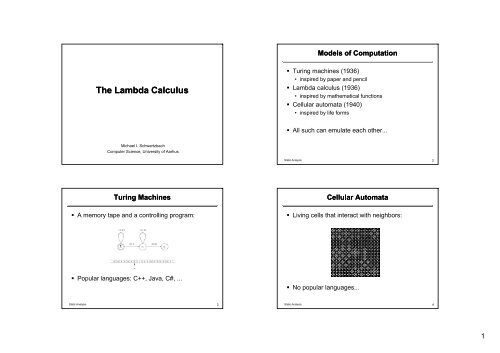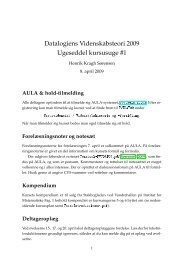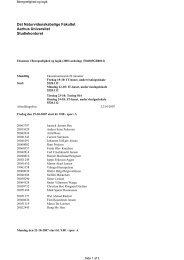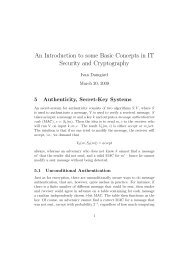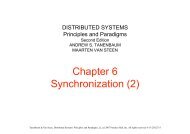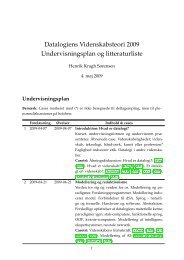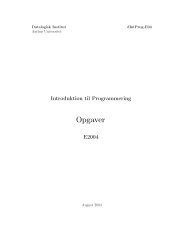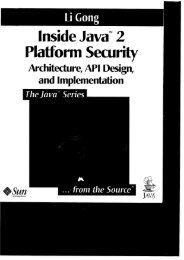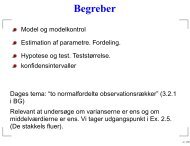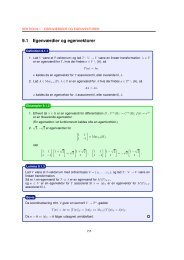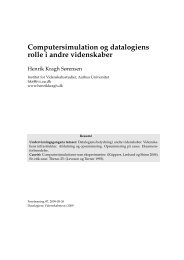The Lambda Calculus
The Lambda Calculus
The Lambda Calculus
Create successful ePaper yourself
Turn your PDF publications into a flip-book with our unique Google optimized e-Paper software.
Models of Computation<br />
<strong>The</strong> <strong>Lambda</strong> <strong>Calculus</strong><br />
• Turing machines (1936)<br />
• inspired by paper and pencil<br />
• <strong>Lambda</strong> calculus (1936)<br />
• inspired by mathematical functions<br />
• Cellular automata (1940)<br />
• inspired by life forms<br />
• All such can emulate each other...<br />
Michael I. Schwartzbach<br />
Computer Science, University of Aarhus<br />
Static Analysis<br />
2<br />
Turing Machines<br />
Cellular Automata<br />
• A memory tape and a controlling program:<br />
• Living cells that interact with neighbors:<br />
• Popular languages: C++, Java, C#, ...<br />
• No popular languages...<br />
Static Analysis<br />
3<br />
Static Analysis<br />
4<br />
1
<strong>Lambda</strong> <strong>Calculus</strong><br />
<strong>The</strong> Role of <strong>The</strong> <strong>Lambda</strong> <strong>Calculus</strong><br />
• Functional expressions being rewritten:<br />
(λf.(λg.gf(λfx.f(f(f(fx)))))(λhz.hzz))<br />
(λg.g(λxy.(λnfx.f(nfx))((λnfx.f(nfx))<br />
(λhz.hzz)(λxy.(λnfx.f(nfx))<br />
(λz.(λxy.(λnfx.f(nfx))((λnfx.f(nfx))<br />
(λxy.(λnfx.f(nfx))((λnfx.f(nfx))<br />
(λy.(λnfx.f(nfx))((λnfx.f(nfx))<br />
(λnfx.f(nfx))((λnfx.f(nfx))<br />
λfx.f((λfx.f((λfx.(λfx.f(f(f(fx))))<br />
λfx.f((λx.f((λfx.(λfx.f(f(f(fx))))<br />
λfx.f(f((λfx.(λfx.f(f(f(fx))))<br />
λfx.f(f((λx.(λfx.f(f(f(fx))))<br />
λfx.f(f((λfx.f(f(f(fx))))<br />
λfx.f(f((λx.f(f(f(fx))))<br />
λfx.f(f(f(f(f(f(f(f(f(fx)))))))))<br />
((λmnfx.mf(nfx))xy)))zz)<br />
(λxy.(λnfx.f(nfx))((λnfx.f(nfx)<br />
((λnfx.f(nfx))((λmnfx.mf(nfx))xy)))<br />
((λmnfx.mf(nfx))(λfx.f(f(f(fx))))y)))<br />
((λnfx.(λfx.f(f(f(fx))))f(nfx))<br />
(λfx.(λfx.f(f(f(fx))))<br />
(λfx.f((λfx.(λfx.f(f(f(fx))))<br />
f((λfx.f(f(f(fx))))fx))x))<br />
f((λfx.f(f(f(fx))))fx)))<br />
((λx.f(f(f(fx))))x)))<br />
(f(f(f(fx))))))<br />
((λmnfx.mf(nfx))xy)))(λfx.f(f(f(fx))))<br />
f((λfx.f(f(f(fx))))fx))fx))x)<br />
f((λfx.f(f(f(fx))))fx))fx))fx)<br />
f((λfx.f(f(f(fx))))fx))fx))<br />
f((λfx.f(f(f(fx))))fx)))<br />
((λmnfx.mf(nfx))xy)))<br />
(λfx.f(f(f(fx))))))<br />
(λfx.f(f(f(fx)))))(λhz.hzz)<br />
• Popular languages: Haskell, ML, Scheme...<br />
• <strong>The</strong> origin of many fundamental programming<br />
language concepts<br />
• <strong>The</strong> inner workings of all functional languages<br />
• <strong>The</strong> "white lab mouse" of language research:<br />
• start with the lambda calculus<br />
• extend it with some novel features<br />
• experiment with the resulting language<br />
• Just plain fun (if you love programming)<br />
Static Analysis<br />
5<br />
Static Analysis<br />
6<br />
Syntax of the <strong>Lambda</strong> <strong>Calculus</strong><br />
Syntactic Conventions<br />
• Only three grammar rules:<br />
• We use currying as syntactic sugar:<br />
E →λx.E |<br />
E 1 E 2 |<br />
x<br />
(function definition)<br />
(function application)<br />
(variable reference)<br />
λx 1 x 2 x 3 ...x k .E ≡ λx 1 .λx 2 .λx 3 .... λx k .E<br />
• Application is left-associative:<br />
• Example terms:<br />
λx.x<br />
(identity function)<br />
λf.λg.λx.f(gx) (function composition)<br />
λx.xyz ()<br />
E 1 E 2 E 3 ...E k ≡ (...((E((E 1 E 2 )E 3 )...E k )<br />
Static Analysis<br />
7<br />
Static Analysis<br />
8<br />
2
Bound and Free Variables<br />
Alpha Conversion<br />
• A variable is bound to the nearest declaration:<br />
• Bound variables may be renamed:<br />
λx.λy.xy(λx.yx)x<br />
λx.x ≡ λa.a<br />
λf.λg.λx.f(gx) ≡ λg.λf.λz.g(fz)<br />
• A variable that is not bound is called free:<br />
λx.λy.xy(λx.yz)x<br />
which does not change the meaning of the term<br />
• Free variables cannot be renamed:<br />
λx.xyz ≡λa.ayz<br />
Static Analysis<br />
9<br />
Static Analysis<br />
10<br />
Beta Reduction<br />
Substitution<br />
• <strong>The</strong> computational engine of the calculus<br />
• Reductions correspond to single steps<br />
• A redex is an opportunity to reduce:<br />
(λx.E 1 )E 2<br />
• <strong>The</strong> reduction substitues all free occurrences of<br />
the variable x in E 1 with a copy of E 2 :<br />
E 1 [x\E 2 ]<br />
(λx.yxzx(λx.yx)x)(abc)<br />
(yxzx(λx.yx)x)[x\abc]<br />
(yxzx(λx.yx)x)[x\abc]<br />
( y))[ y(abc)z(abc)(λx.yx)(abc)<br />
find redex<br />
reduce<br />
find free occurrences<br />
substitute<br />
Static Analysis<br />
11<br />
Static Analysis<br />
12<br />
3
Example Beta Reduction<br />
(λfgx.f(gx))(λa.a)(λb.bb)c →<br />
(λgx.(λa.a)(gx))(λb.bb)c →<br />
(λgx.gx)(λb.bb)c →<br />
(λx.(λb.bb)x)c →<br />
(λx.xx)c →<br />
cc<br />
Computing by Reduction<br />
• Intuitively, beta reduction models computations by<br />
simplifying expressions:<br />
(λxy.x(2*y))(λz.z+1)5 →<br />
(λy.(λz.z+1)(2*y))5→<br />
(λz.z+1)(2*5) →<br />
2*5+1→<br />
11<br />
• However, we don't have numbers and such yet...<br />
Static Analysis<br />
13<br />
Static Analysis<br />
14<br />
• A simple reduction:<br />
Variable Capture<br />
(λxa.xa)(λx.xa) → λa.(λx.xa)a →λa.aa<br />
• Now, first alpha convert λxa.xa to λxb.xb:<br />
(λxb.xb)(λx.xa) xb)(λx xa) → λb.(λx.xa)b xa)b → λb.baba<br />
Avoiding Variable Capture<br />
• <strong>The</strong> problem occurs when a term with a free<br />
variable is copied into a term where that variable<br />
is already bound<br />
• <strong>The</strong> solution is to implicitly alpha convert the<br />
bound variable into something harmless:<br />
(λxa.xa)(λx.xa) → λb.(λx.xa)b →λb.ba<br />
• <strong>The</strong> results are different, but alpha conversion<br />
should not change the meaning<br />
Static Analysis<br />
15<br />
Static Analysis<br />
16<br />
4
Normal Forms and Termination<br />
Reduction Strategies<br />
• A term with no more redexes is a normal form<br />
• Normal forms correspond to the results of our<br />
computations (values in Haskell)<br />
• Not all terms have normal forms:<br />
• More that one redex may be available:<br />
(λfgx.f(gx))(λa.a)(λb.bb)c →<br />
(λgx.(λa.a)(gx))(λb.bb)c → ...<br />
(λx.xx)(λx.xx) → (λx.xx)(λx.xx) → ...<br />
(λx.xxx)(λx.xxx) xxx)(λx xxx) → (λx.xxx)(λx.xxx)(λx.xxx) xxx)(λx xxx)(λx xxx) → ...<br />
• Which one should we reduce<br />
Static Analysis<br />
17<br />
Static Analysis<br />
18<br />
Confluence<br />
Call-By-Name Reduction<br />
• Fortunately, all strategies can only reach the<br />
same normal form:<br />
• Not all strategies are equally good at terminating<br />
(λfgx.f(gx))(λa.a)(λb.bb)c →<br />
(λgx.(λa.a)(gx))(λb.bb)c →<br />
(λgx.gx)(λb.bb)c →<br />
(λx.(λb.bb)x)c →<br />
(λx.xx)c →<br />
cc<br />
(λfgx.f(gx))(λa.a)(λb.bb)c →<br />
(λgx.(λa.a)(gx))(λb.bb)c →<br />
(λx.(λa.a)((λb.bb)x))c →<br />
(λa.a)((λb.bb)c) →<br />
(λa.a)(cc) →<br />
cc<br />
• But one strategy always terminates if possible:<br />
call-by-name reduction selects the left-most<br />
available redex in the term<br />
• This is also known as lazy evaluation (in Haskell)<br />
Static Analysis<br />
19<br />
Static Analysis<br />
20<br />
5
Call-By-Value Reduction<br />
CBN vs. CBV<br />
• Call-by-name is often rather slow, since<br />
arguments may be evaluated several times for<br />
each use<br />
• CBV sometimes fails to terminate:<br />
(λx.a)((λy.yy)(λy.yy)) → CBN a<br />
• Call-by-value is an alternative that tries to<br />
evaluate the arguments only once<br />
(λx.a)((λy.yy)(λy.yy)) → CBV (λx.a)((λy.yy)(λy.yy)) → ...<br />
• This is known as eager evaluation in ML,<br />
Scheme, Java, and most other languages<br />
• CBV is often faster (but not always)<br />
Static Analysis<br />
21<br />
Static Analysis<br />
22<br />
Abstract Values<br />
Encoding Values<br />
• Normal forms are values, but they mean nothing<br />
in particular by themselves:<br />
• λx.xx<br />
• abc<br />
• λxy.yyyyyyx<br />
• But similarly, bit patterns in memory mean nothing<br />
by themselves:<br />
1 0 1 1 0 0 1 0 0 0 1 0 1 1 1 1<br />
1 0 0 0 1 1 1 0 0 0 0 1 1 1 0 0<br />
0 0 0 0 0 0 1 1 0 1 1 1 0 0 0 1<br />
1 0 0 0 0 1 1 1 0 1 0 0 0 1 1 1<br />
• Interesting values must be encoded in the model:<br />
1 0 1 1 0 0 1 0 0 0 1 0 1 1 1 1<br />
45615<br />
1 0 0 0 1 1 1 0 0 0 0 1 1 1 0 0<br />
♣<br />
0 0 0 0 0 0 1 1 0 1 1 1 0 0 0 1<br />
"AX"<br />
1 0 0 0 0 1 1 1 0 1 0 0 0 1 1 1<br />
true<br />
• Programming is:<br />
Information Representation Transformation<br />
Static Analysis<br />
24<br />
Static Analysis<br />
25<br />
6
Church Numerals<br />
<strong>The</strong> Successor Function<br />
• An encoding of natural numbers:<br />
• 0 ≡λfx.x<br />
• 1 ≡λfx.fx<br />
• 2 ≡λfx.f(fx)<br />
• 3 ≡λfx.f(f(fx))<br />
• ...<br />
• A term that computes n+1 given a number n:<br />
• succ ≡ λnfx.f(nfx)<br />
• Why does this work:<br />
succ 3 ≡<br />
(λnfx.f(nfx))(λfx.f(f(fx))) →<br />
λfx.f((λfx.f(f(fx)))fx) →<br />
λfx.f((λx.f(f(fx)))x) →<br />
• An encoding of boolean values:<br />
λfx.f(f(f(fx)) f(f(f(fx)) ≡ 4<br />
• true ≡ λxy.x<br />
• false ≡λxy.y<br />
• An induction proof shows that this always works<br />
Static Analysis<br />
26<br />
Static Analysis<br />
27<br />
Testing for Zero<br />
Arithmetic Operations<br />
• iszero ≡ λn.n(λx.(λxy.y))(λxy.x)<br />
iszero 0 ≡<br />
(λn.n(λx.(λxy.y))(λxy.x))(λfx.x) n(λx (λxy y))(λxy x))(λfx x) →<br />
(λfx.x)(λxxy.y)(λxy.x) →<br />
(λx.x)(λxy.x) →<br />
λxy.x ≡ true<br />
• Boolean operations:<br />
• and ≡ λxy.xy(λxy.y)<br />
• or ≡λxy.x(λxy.y)(λxy.x)<br />
• not ≡ λx.x(λxy.y)(λxy.x)<br />
iszero 3 ≡<br />
(λn.n(λx.(λxy.y))(λxy.x))(λfx.f(f(fx)) →<br />
(λfx.f(f(fx)))(λxxy.y)(λxy.x) ( ( yy)( y ) →<br />
(λx.(λxxy.y)((λxxy.y)((λxxy.y)x)))(λxy.x) →<br />
(λxxy.y)((λxxy.y)((λxxy.y)(λxy.x))) →<br />
λxy.y ≡ false<br />
• Integer operations:<br />
• pred ≡λnfx.n(λgh.h(gf))(λu.x)(λu.u)<br />
• plus ≡λmnfx.mf(nfx)<br />
• mult ≡λmnf.n(mf)<br />
Static Analysis<br />
28<br />
Static Analysis<br />
29<br />
7
<strong>The</strong> Fun Language<br />
<strong>The</strong> Factorial Function<br />
E → int | true | false |<br />
(literals)<br />
id |<br />
(variables)<br />
(E)|<br />
(parentheses)<br />
succ(E) | pred(E) | iszero(E) |<br />
(integers)<br />
letrec fac(n) = if (iszero(n)) 1<br />
else mult(n,fac(pred(n)))<br />
in fac(6)<br />
plus(E 1 ,E 2 ) | mult(E 1 ,E 2 ) |<br />
(integers)<br />
not(E) | and(E 1 ,E 2 ) | or(E 1 ,E 2 ) |<br />
pair(E 1 ,E 2 ) | first(E) | second(E) |<br />
(booleans)<br />
(pairs)<br />
• <strong>The</strong> result is 720<br />
cons(E 1 ,E 2 ) | head(E) | tail(E) |<br />
(streams)<br />
if (E 1 )E 2 else E 3 |<br />
(conditionals)<br />
id ( E 1 , ..., E k ) |<br />
(function call)<br />
let id = E 1 in E 2 |<br />
(locals)<br />
let id(id 1 , ..., id k ) = E 1 in E 2 |<br />
(functions)<br />
letrec id(id 1 , ..., id k ) = E 1 in E 2<br />
(recursive functions)<br />
Static Analysis<br />
30<br />
Static Analysis<br />
31<br />
A Higher-Order Function<br />
Stream Programming<br />
let f(x,y) = succ(succ(plus(x,y))) in<br />
let g(h,z) = h(z,z) in<br />
g(f,4)<br />
letrec inf(n) = cons(n,inf(succ(n))) in<br />
head(tail(tail(inf(7))))<br />
• <strong>The</strong> result is 9<br />
• <strong>The</strong> result is 10<br />
Static Analysis<br />
32<br />
Static Analysis<br />
33<br />
8
A Fibonacci Stream<br />
Compiling From Fun To <strong>Lambda</strong> (1/3)<br />
letrec fib(x,y) =<br />
(let z = plus(x,y) in cons(z,fib(y,z))) in<br />
letrec take(n,s) =<br />
if (iszero(n)) 0<br />
else pair(head(s),take(pred(n),tail(s))) in<br />
take(6,fib(0,1))<br />
• <strong>The</strong> result is:<br />
pair(1,pair(2,pair(3,pair(5,pair(8,pair(13,0))))))<br />
⎡k⎤ ≡λfx.f k x<br />
⎡true⎤ ≡λxy.x<br />
⎡false⎤ ≡ λxy.yy<br />
⎡id⎤ ≡ id<br />
⎡succ(E)⎤ ≡ (λnfx.f(nfx)) ⎡E⎤<br />
⎡pred(E)⎤ ≡ (λnfx.n(λgh.h(gf))(λu.x)(λu.u)) ⎡E⎤<br />
⎡iszero(E)⎤ ≡ (λn.n(λx.(λxy.y))(λxy.x)) ⎡E⎤<br />
⎡plus(Ep ( 1 1, ,E 2 2) )⎤ ≡ (λmnfx.mf(nfx)) ( ⎡E 1⎤ ⎡E 2⎤<br />
⎡mult(E 1 ,E 2 )⎤ ≡ (λmnf.n(mf)) ⎡E 1 ⎤⎡E 2 ⎤<br />
⎡not(E)⎤ ≡ (λx.x(λxy.y)(λxy.x)) ⎡E⎤<br />
⎡and(E 1 ,E 2 )⎤ ≡ (λxy.xy(λxy.y)) ⎡E 1 ⎤⎡E 2 ⎤<br />
⎡or(E 1 ,E 2 )⎤ ≡ (λxy.x(λxy.x)y) ⎡E 1 ⎤⎡E 2 ⎤<br />
Static Analysis<br />
34<br />
Static Analysis<br />
35<br />
Compiling From Fun To <strong>Lambda</strong> (2/3)<br />
Compiling From Fun To <strong>Lambda</strong> (3/3)<br />
⎡pair(E 1 ,E 2 )⎤ ≡ (λabx.xab) ⎡E 1 ⎤⎡E 2 ⎤<br />
⎡first(E)⎤ ≡ (λp.p(λxy.x)) ⎡E⎤<br />
⎡second(E)⎤ ≡ (λp.p(λxy.y)) ⎡E⎤<br />
⎡cons(E 1 ,E 2 )⎤ ≡ (λabx.xab) ⎡E 1 ⎤⎡E 2 ⎤<br />
⎡head(E)⎤ ≡ (λp.p(λxy.x)) ⎡E⎤<br />
⎡tail(E)⎤ ≡ (λp.p(λxy.y)) ⎡E⎤<br />
⎡if (E1) E2 else E3⎤ ≡ ⎡E 1 ⎤⎡E 2 ⎤⎡E 3 ⎤<br />
⎡id(E 1 ,...,E k )⎤ ≡ ⎡id⎤ ⎡E 1 ⎤ ... ⎡E k ⎤<br />
⎡let id = E 1 in E 2 ⎤ ≡ (λid.⎡E 2 ⎤) ⎡E 1 ⎤<br />
⎡let id(id 1 ,...,id k ) = E 1 in E 2 ⎤ ≡ (λid.⎡E 2 ⎤)(λid 1 ... λid k . ⎡E 1 ⎤)<br />
⎡letrec id(id 1 ,...,id k ) = E 1 in E 2 ⎤ ≡<br />
(λid.⎡E 2 ⎤)(Y(λid.λid 1 ... λid k . ⎡E 1 ⎤))<br />
where Y is a fixed-point operator such that YX → X(YX)<br />
• Y is used to enable recursive calls<br />
• It provides dynamic unfoldings of the definition:<br />
Y(λid.λid 1 ... λid k . ⎡E 1 ⎤) →<br />
(λid.λid 1 ... λid k . ⎡E 1 ⎤)(Y(λid.λid 1 ... λid k . ⎡E 1 ⎤))<br />
Static Analysis<br />
36<br />
Static Analysis<br />
37<br />
9
<strong>The</strong> Fixed-Point Operator in Action<br />
Concrete Fixed-Point Operators<br />
• <strong>The</strong> program:<br />
• A famous fixed-point operator (1936):<br />
letrec f(n) = if (iszero(n)) 42 else f(pred(n)) in f(87)<br />
is compiled into:<br />
Y ≡ ZZ ≡ (λxy.y(xxy))(λxy.y(xxy))<br />
(λf.f⎡87⎤)(YF)<br />
where F ≡ λf. λn.(⎡iszero⎤n) ⎡42⎤(f(⎡pred⎤n))<br />
• It works:<br />
(λf.f⎡87⎤)(YF) →<br />
(YF) ⎡87⎤ →<br />
F((YF)) ⎡87⎤ →<br />
(λf. λn.(⎡iszero⎤n) ⎡42⎤(f(⎡pred⎤n)))((YF)) ⎡87⎤ →<br />
(⎡iszero⎤ ⎡87⎤) ⎡42⎤(((YF))(⎡pred⎤ ⎡87⎤)) →<br />
((YF))(⎡pred⎤ ⎡87⎤) → (YF) ⎡86⎤ → ...<br />
YF ≡ (ZZ)F → (λy.y(ZZy))F y(ZZy))F → F(ZZF) ≡ F(YF)<br />
• <strong>The</strong>re are infinitely many such operators<br />
Static Analysis<br />
38<br />
Static Analysis<br />
39<br />
Compiling for CBV<br />
CBN vs. CBV<br />
• <strong>The</strong> previous compilation only works for CBN<br />
• For CBV:<br />
• the Y operator loops<br />
• the if-expression always evaluates both branches<br />
and both things are bad for recursion<br />
let f(x) = pair(x,pair(x,pair(x,pair(x,pair(x,pair(x,0))))))<br />
in f(f(f(f(2))))<br />
• CBN: 3,368 reductions, CBV: 53 reductions<br />
• We must delay some reductions:<br />
• ⎡if (E1) E2 else E3⎤ ≡ ⎡E 1 ⎤ (λa.⎡E 2 ⎤ a)(λb.⎡E 3 ⎤b) )<br />
• fixed-point operator: λg.(λx.g(λy.xxy)) (λx.g(λy.xxy))<br />
• Still, streams only work with CBN (as in Haskell)<br />
let f(x) = pair(x,pair(x,pair(x,pair(x,pair(x,pair(x,0)))))) in<br />
let g(y) = 7 in<br />
g(f(f(f(f(2)))))<br />
• CBN: 3 reductions, CBV: 55 reductions<br />
Static Analysis<br />
41<br />
Static Analysis<br />
42<br />
10
Runtime Errors (1/2)<br />
Runtime Errors (2/2)<br />
• Fun programs do not generate runtime errors:<br />
• no division operator<br />
• no empty list<br />
• no type checking<br />
• A program is compiled into a <strong>Lambda</strong> term<br />
• <strong>The</strong> term is reduced to a normal form, which may<br />
turn out to be pure nonsense:<br />
mult(true,pair(1,2)) → λf.f(λfx.f(fx)) ≡ <br />
• Even worse, sometimes the nonsense actually<br />
happens to make sense:<br />
let a = succ(first(1)) in<br />
let b = a(3) in → 27<br />
b(cons(true,87))<br />
• This means that errors are not detected!<br />
Static Analysis<br />
43<br />
Static Analysis<br />
44<br />
Modelling Runtime Errors (1/2)<br />
Modelling Runtime Errors (2/2)<br />
• To catch runtime errors, programs must be<br />
compiled in a more complicated manner<br />
• Each value is modelled as a pair(tag,val) where:<br />
• val is the "old" value<br />
• tag is an integer interpreted as:<br />
• 0: runtime error<br />
• 1: integer<br />
• 2: boolean<br />
• 3: pair<br />
• 4: stream<br />
• 5: function with 1 argument<br />
• 6: function with 2 arguments<br />
• 7: function with 3 arguments<br />
• ...<br />
• ⎡E⎤ denotes the old compilation<br />
• ⎡⎡E⎤⎤ denotes the new compilation<br />
• Examples:<br />
⎡⎡k⎤⎤ ≡ ⎡pair(1,k)⎤<br />
⎡⎡plus(E 1 ,E 2 )⎤⎤ ≡<br />
⎡ let x = E 1 in<br />
lety=E 2 in<br />
if (and(iszero(pred(first(x))),iszero(pred(first(y))<br />
pair(1,plus(second(x),second(y)))<br />
else<br />
pair(0,0)⎤<br />
Static Analysis<br />
45<br />
Static Analysis<br />
46<br />
11
Type Checking<br />
Undecidability<br />
• Fun contains many "wild" terms:<br />
• It is not possible to decide if a program will cause<br />
a runtime type error during execution:<br />
let a = succ(first(1)) in<br />
let b = a(3) in<br />
b(cons(true,87))<br />
• <strong>The</strong> compiler should detect such type errors:<br />
• errors are caught earlier in the development process<br />
• compile-time type checking avoids run-time type tags<br />
type correct<br />
type errors<br />
Static Analysis<br />
47<br />
Static Analysis<br />
48<br />
Static Type Checking<br />
Types for Fun<br />
• Assign a type to every expression<br />
• Check that certain type rules are satisfied<br />
• If so, then no type errors will occur<br />
type correct<br />
statically type correct<br />
• A type is used to classify values:<br />
τ → int |<br />
boolean |<br />
pair(τ 1 , τ 2 ) |<br />
stream(τ) |<br />
fun(τ 1 , ..., τ k , τ)<br />
Static Analysis<br />
49<br />
Static Analysis<br />
50<br />
12
Type Examples<br />
Type Checking<br />
• fac: fun(int, int)<br />
• fib: fun(int,int,stream(int))<br />
let f(x,y) = succ(succ(plus(x,y))) in<br />
let g(h,z) = h(z,z) in<br />
g(f,4)<br />
• f:<br />
• g:<br />
fun(int,int,int)<br />
fun(fun(int,int,int),int,int)<br />
int) int)<br />
letrec inf(n) = cons(n,inf(succ(n))) in head(tail(tail(inf(7))))<br />
• inf: fun(int,stream(int))<br />
• Assign a type variable [[E]] to every expression E<br />
• Generate type constraints relating these<br />
variables to each other<br />
• Solve the constraints using some algorithm<br />
<strong>The</strong> generated constraints are solvable<br />
⇓<br />
<strong>The</strong> program is statically type correct<br />
⇓<br />
No type errors will occur at runtime<br />
Static Analysis<br />
51<br />
Static Analysis<br />
52<br />
Symbol Checking<br />
Unique Identifiers<br />
• We must first check that all used identifiers are<br />
also declared<br />
• Fun has ordinary scope rules:<br />
letrec fib(x,y) =<br />
(let z = plus(x,y) in cons(z,fib(y,z))) in<br />
letrec take(n,s) =<br />
if (iszero(n)) 0<br />
else pair(head(z),take(pred(n),tail(s))) in<br />
take(6,fib(0,1))<br />
• We then rename all identifiers to be unique:<br />
let f(f) = succ(f) in<br />
let f(f) = pair(f,let f = 17 in f)<br />
in f(10)<br />
let f(f1) = succ(f1) in<br />
let f2(f3) = pair(f3,let f4 = 17 in f4)<br />
in f2(10)<br />
Static Analysis<br />
53<br />
Static Analysis<br />
54<br />
13
Generating Constraints<br />
Type Constraints (1/3)<br />
iszero(E)<br />
• "<strong>The</strong> argument must be of type int and the result is of type boolean"<br />
• [[E]] = int ∧ [[iszero(E)]] = boolean<br />
if (E 1 ) E 2 else E 3<br />
• "<strong>The</strong> condition must be of type boolean, both brances must have the<br />
same type, and the whole expression has the same type as the<br />
branches"<br />
• [[E 1 ]] = boolean ∧<br />
[[if (E 1 ) E 2 else E 3 ]] = [[E 2 ]] = [[E 3 ]]<br />
k: [[k]] = int<br />
true:<br />
[[true]] = boolean<br />
false:<br />
[[false]] = boolean<br />
id:<br />
no constraints<br />
succ(E):<br />
[[E]] = [[succ(E)]] = int<br />
pred(E):<br />
[[E]] = [[pred(E)]] = int<br />
iszero(E): [[E]] = int ∧ [[iszero(E)]] = boolean<br />
plus(E 1 ,E 2 ):<br />
[[plus(E 1 ,E 2 )]] = [[E 1 ]] = [[E 2 ]] = int<br />
mult(E 1 ,E 2 ): [[mult(E 1 ,E 2 )]] = [[E 1 ]] = [[E 2 ]] = int<br />
not(E):<br />
[[E]] = [[not(E)]] = boolean<br />
and(E 1 ,E 2 ): [[and(E 1 ,E 2 )]] = [[E 1 ]] = [[E 2 ]] = boolean<br />
Static Analysis<br />
55<br />
Static Analysis<br />
56<br />
Type Constraints (2/3)<br />
Type Constraints (3/3)<br />
or(E 1 ,E 2 ): [[or(E 1 ,E 2 )]] = [[E 1 ]] = [[E 2 ]] = boolean<br />
pair(E 1 ,E 2 ): [[pair(E 1 ,E 2 )]] = pair([[E 1 ]],[[E 2 ]])<br />
first(E):<br />
[[E]] = pair([[first(E)]],α)<br />
)<br />
second(E): [[E]] = pair(α,[[second(E)]])<br />
cons(E 1 ,E 2 ): [[cons(E 1 ,E 2 )]] = stream([[E 1 ]]) = [[E 2 ]]<br />
head(E):<br />
[[E]] = stream([[head(E)]])<br />
tail(E):<br />
[[E]] = [[tail(E)]] = stream(α)<br />
if (E 1 )E 2 else E 3 :<br />
[[E 1 ]] = boolean ∧<br />
[[E 2 ]] = [[E 3 ]] = [[if (E 1 ) E 2 else E 3 ]]<br />
id(E 1 ,...,E k ): [[id]] = fun([[E 1 ]],...,[[E k ]],[[id(E 1 ,...,E k )]])<br />
let id = E 1 in E 2 :<br />
[[id]] = [[E 1 ]] ∧ [[let id = E 1 in E 2 ]] = [[E 2 ]]<br />
let id(id 1 ,...,id k ) = E 1 in E 2 :<br />
[[id]] = fun([[id 1 ]],...,[[id k ]],[[E 1 ]]) ∧<br />
[[let id(id 1 ,...,id k ) = E 1 in E 2 ]] = [[E 2 ]]<br />
letrec id(id 1 ,...,id k )=E 1 in E 2 :<br />
[[id]] = fun([[id 1 ]],...,[[id k ]],[[E 1 ]]) ∧<br />
[[letrec id(id 1 ,...,id k ) = E 1 in E 2 ]] = [[E 2 ]]<br />
α is a "fresh" type variable<br />
Static Analysis<br />
57<br />
Static Analysis<br />
58<br />
14
Constraints Are Equalities<br />
<strong>The</strong> Factorial Function (1/3)<br />
• All type constraints are of the form:<br />
T 1 =T<br />
2<br />
where T i is a type term with variables:<br />
letrec fac(n) = if (iszero(n)) 1<br />
else mult(n,fac(pred(n)))<br />
in fac(6)<br />
T → int |<br />
boolean |<br />
pair(T i(T 1 , T 2 )|<br />
stream(T) |<br />
fun(T 1 , ..., T k , T) |<br />
α<br />
Static Analysis<br />
59<br />
Static Analysis<br />
65<br />
<strong>The</strong> Factorial Function (2/3)<br />
<strong>The</strong> Factorial Function (3/3)<br />
[[fac]] = fun([[n]],[[1:if (iszero(n)) 1 else mult(n,fac(pred(n)))]])<br />
[[letrec fac(n) = if (iszero(n)) 1 else mult(n,fac(pred(n))) in fac(6)]] = [[fac(6)]<br />
[[iszero(n)]] = boolean<br />
[[if (iszero(n)) 1 else mult(n,fac(pred(n)))]] = [[1]]<br />
[[if (iszero(n)) 1 else mult(n,fac(pred(n)))]] = [[mult(n,fac(pred(n)))]]<br />
[[1]]= int<br />
[[mult(n,fac(pred(n)))]] = int<br />
[[n]] = int<br />
[[fac(pred(n))]] = int<br />
[[fac]] = fun([[pred(n)]],[[fac(pred(n))]])<br />
[[pred(n)]] = int<br />
[[n]] = int<br />
[[fac]] = fun([[6]],[[fac(6)]])<br />
[[6]] = int<br />
[[n]] = int<br />
[[1]] = int<br />
[[fac]] = fun(int,int)<br />
[[mult(n,fac(pred(n)))]] = int<br />
[[6]] = int<br />
[[pred(n)]] = int<br />
[[fac(6)]] = int<br />
[[iszero(n)]] = boolean<br />
[[fac(pred(n))]] = int<br />
[[if (iszero(n)) 1 else mult(n,fac(pred(n)))]] = int<br />
[[letrec fac(n) = if (iszero(n)) 1 else mult(n,fac(pred(n))) in fac(6)]] = int<br />
Static Analysis<br />
66<br />
Static Analysis<br />
67<br />
15
<strong>The</strong> Nonsense Program (1/3)<br />
<strong>The</strong> Nonsense Program (2/3)<br />
let a = succ(first(1)) in<br />
let b = a(3) in<br />
b(cons(true,87))<br />
[[a]] = [[succ(first(1))]]<br />
[[let a = succ(first(1)) in let b = a(3) in b(cons(true,87))]] =<br />
[[let b = a(3) in b(cons(true,87))]]<br />
[[succ(first(1))]] = int<br />
[[first(1)]] = int<br />
[[1]] = pair([[4:first(1)]],[[6]])<br />
[[1]] = int<br />
[[b]] = [[a(3)]]<br />
[[let b = a(3) in b(cons(true,87))]] = [[b(cons(true,87))]]<br />
[[a]] = fun([[3],[[7:a(3)]])<br />
[[3]] = int<br />
[[b]] = fun([[cons(true,87)],[[b(cons(true,87))]])<br />
[[cons(true,87)]] = [[87]]<br />
[[cons(true,87)]] = stream([[true]])<br />
[[87]] = int<br />
[[true]] = boolean<br />
Static Analysis<br />
68<br />
Static Analysis<br />
69<br />
<strong>The</strong> Nonsense Program (3/3)<br />
Efficiency Through Types<br />
*** unification constructor error<br />
pair(int,#v1)<br />
int<br />
• Untyped programs must use the expensive<br />
compilation strategy: ⎡⎡E⎤⎤<br />
• Typed programs can use the much cheaper<br />
strategy: ⎡E⎤<br />
• <strong>The</strong> type error is caught at compile-time<br />
• Errors must be caught at either runtime or at<br />
compile-time<br />
Static Analysis<br />
70<br />
Static Analysis<br />
71<br />
16
Slack<br />
Concrete Slack<br />
• A type checker will unfairly reject some programs:<br />
type correct<br />
statically type correct<br />
letrec fac2(n,foo) =<br />
if (iszero(n)) 1 else mult(n,foo(pred(n),foo))<br />
in fac2(6,fac2)<br />
slack<br />
letrec f(n) = pair(n,f(pred(n)))<br />
in first(second(second(f(7))))<br />
Static Analysis<br />
72<br />
Static Analysis<br />
73<br />
Fighting Slack<br />
Regular Types<br />
• Make the type checker a bit more clever:<br />
τ → int |<br />
boolean |<br />
pair(τ 1 , τ 2 ) |<br />
stream(τ) |<br />
fun(τ 1 , ..., τ k , τ)<br />
• We have assumed finite types<br />
• An eternal struggle...<br />
• But we can accept more program if allow also<br />
infinite, but regular types<br />
Static Analysis<br />
74<br />
Static Analysis<br />
75<br />
17
Regular Terms<br />
Regular Types in Action<br />
• Infinite but (eventually) repeating:<br />
• e(e(e(e(e(e(...))))))<br />
• d(a,d(a,d(a, ...)))<br />
• f(f(f(f(...),f(...)),f(f(...),f(...))),f(f(f(...),f(...)),f(f(...),f(...))))<br />
• A non-regular term:<br />
letrec fac2(n,foo) =<br />
if (iszero(n)) 1 else mult(n,foo(pred(n),foo))<br />
in fac2(6,fac2)<br />
• This function now has a type:<br />
[[fac2]] = fun(int,fun(int,fun(int,...,int),int),int)<br />
int) int) int)<br />
• f(a,f(d(a),f(d(d(a)),f(d(d(d(a))),...))))<br />
Static Analysis<br />
76<br />
Static Analysis<br />
78<br />
Polymorphism<br />
Polymorphic Expansion (1/3)<br />
• We still cannot type check a polymorphic function:<br />
let f(x) = pair(x,0) in pair(f(42),f(true))<br />
*** unification constructor error<br />
int<br />
boolean<br />
• <strong>The</strong> function f must have two different types<br />
• Expand all non-recursive functions before<br />
generating the type constraints<br />
let f(x) = pair(x,0) in pair(f(42),f(true))<br />
pair(let f(x) = pair(x,0) in f(42),let f(x) = pair(x,0) in f(true))<br />
pair(let f(x) = pair(x,0) in f(42),<br />
let f1(x1) = pair(x1,0) in f1(true))<br />
Static Analysis<br />
79<br />
Static Analysis<br />
80<br />
18
Polymorphic Expansion (2/3)<br />
Polymorhic Expansion (3/3)<br />
[[pair(let f(x) = pair(x,0) in f(42),let f1(x1) = pair(x1,0) in f1(true))]] =<br />
pair([[let f(x) = pair(x,0) in f(42)],[[let f1(x1) = pair(x1,0) in f1(true)]])<br />
[[f]] = fun([[x],[[pair(x,0)]])<br />
[[let f(x) = pair(x,0) in f(42)]] = [[f(42)]<br />
[[pair(x,0)]] = pair([[x],[[0]])<br />
[[0]] = int<br />
[[f]] = fun([[42],[[f(42)]])<br />
[[42]] = int<br />
[[f1]] = fun([[x1],[[pair(x1,0)]])<br />
[[let f1(x1) = pair(x1,0) in f1(true)]] = [[f1(true)]]<br />
[[pair(x1,0)]] = pair([[x1],[[0]])<br />
[[0]] = int<br />
[[f1]] = fun([[true],[[f1(true)]])<br />
[[true]] = boolean<br />
[[true]] = boolean<br />
[[f1]] = fun(boolean,pair(boolean,int))<br />
[[x]] = int<br />
[[pair(x,0)]] = pair(int,int)<br />
[[f1(true)]] = pair(boolean,int)<br />
[[f(42)]] = pair(int,int)<br />
[[0]] = int<br />
[[pair(let f(x) = pair(x,0) in f(42),let f1(x1) = pair(x1,0) in f1(true))]] =<br />
pair(pair(int,int),pair(boolean,int))<br />
[[pair(x1,0)]] = pair(boolean,int)<br />
[[f]] = fun(int,pair(int,int))<br />
[[x1]] = boolean<br />
[[let f1(x1) = pair(x1,0) in f1(true)]] = pair(boolean,int)<br />
[[let f(x) = pair(x,0) in f(42)]] = pair(int,int)<br />
[[42]] = int<br />
Static Analysis<br />
81<br />
Static Analysis<br />
82<br />
A Polymorphic Explosion (1/2)<br />
A Polymorphic Explosion (2/2)<br />
let f1(y) = pair(y,y) in<br />
let f2(y) = f1(f1(y)) in<br />
let f3(y) = f2(f2(y)) in<br />
let f4(y) = f3(f3(y)) in<br />
f4(0)<br />
• This is polymorphically typable!<br />
• But what is the type of f4<br />
fun(int,pair(pair(pair(pair(pair(pair(pair(pair(int,int),pair(int,int)),pair(pair(int,int),pair(int,int))),pair(pair(pair(in<br />
t,int),pair(int,int)),pair(pair(int,int),pair(int,int)))),pair(pair(pair(pair(int,int),pair(int,int)),pair(pair(int,int),pair(in<br />
t,int))),pair(pair(pair(int,int),pair(int,int)),pair(pair(int,int),pair(int,int))))),pair(pair(pair(pair(pair(int,int),pair(int<br />
,int)),pair(pair(int,int),pair(int,int))),pair(pair(pair(int,int),pair(int,int)),pair(pair(int,int),pair(int,int)))),pair(pair(p<br />
air(pair(int,int),pair(int,int)),pair(pair(int,int),pair(int,int))),pair(pair(pair(int,int),pair(int,int)),pair(pair(int,int),pint) int)) pair(pair(int int) int))) pair(pair(pair(int int) int)) pair(pair(int int) p<br />
air(int,int)))))),pair(pair(pair(pair(pair(pair(int,int),pair(int,int)),pair(pair(int,int),pair(int,int))),pair(pair(pair(int,i<br />
nt),pair(int,int)),pair(pair(int,int),pair(int,int)))),pair(pair(pair(pair(int,int),pair(int,int)),pair(pair(int,int),pair(int,i<br />
nt))),pair(pair(pair(int,int),pair(int,int)),pair(pair(int,int),pair(int,int))))),pair(pair(pair(pair(pair(int,int),pair(int,i<br />
nt)),pair(pair(int,int),pair(int,int))),pair(pair(pair(int,int),pair(int,int)),pair(pair(int,int),pair(int,int)))),pair(pair(p<br />
air(pair(int,int),pair(int,int)),pair(pair(int,int),pair(int,int))),pair(pair(pair(int,int),pair(int,int)),pair(pair(int,int),p<br />
air(int,int))))))),pair(pair(pair(pair(pair(pair(pair(int,int),pair(int,int)),pair(pair(int,int),pair(int,int))),pair(pair(pai<br />
r(int,int),pair(int,int)),pair(pair(int,int),pair(int,int)))),pair(pair(pair(pair(int,int),pair(int,int)),pair(pair(int,int),pai<br />
r(int,int))),pair(pair(pair(int,int),pair(int,int)),pair(pair(int,int),pair(int,int))))),pair(pair(pair(pair(pair(int,int),pair<br />
(int,int)),pair(pair(int,int),pair(int,int))),pair(pair(pair(int,int),pair(int,int)),pair(pair(int,int),pair(int,int)))),pair(pa<br />
ir(pair(pair(int,int),pair(int,int)),pair(pair(int,int),pair(int,int))),pair(pair(pair(int,int),pair(int,int)),pair(pair(int,int<br />
),pair(int,int)))))),pair(pair(pair(pair(pair(pair(int,int),pair(int,int)),pair(pair(int,int),pair(int,int))),pair(pair(pair(i<br />
i t)))))) i ( i ( i ( i ( i ( i t i t) i t i t)) i ( i t i t) i t i t))) i ( i ( i nt,int),pair(int,int)),pair(pair(int,int),pair(int,int)))),pair(pair(pair(pair(int,int),pair(int,int)),pair(pair(int,int),pair(i<br />
nt,int))),pair(pair(pair(int,int),pair(int,int)),pair(pair(int,int),pair(int,int))))),pair(pair(pair(pair(pair(int,int),pair(i<br />
nt,int)),pair(pair(int,int),pair(int,int))),pair(pair(pair(int,int),pair(int,int)),pair(pair(int,int),pair(int,int)))),pair(pair<br />
(pair(pair(int,int),pair(int,int)),pair(pair(int,int),pair(int,int))),pair(pair(pair(int,int),pair(int,int)),pair(pair(int,int),<br />
pair(int,int)))))))))<br />
Static Analysis<br />
83<br />
Static Analysis<br />
84<br />
19
Always More Slack<br />
Things to Worry About<br />
• Regular types and polymorphism is not enough:<br />
letrec f(n) = if (iszero(n)) 0<br />
else pair(f(pred(n)),f(pred(n))) in f(4)<br />
is unfairly rejected by the type checker<br />
<strong>The</strong> type checker is unsound<br />
<strong>The</strong> type checker is undecidable<br />
Static Analysis<br />
86<br />
Static Analysis<br />
87<br />
20


